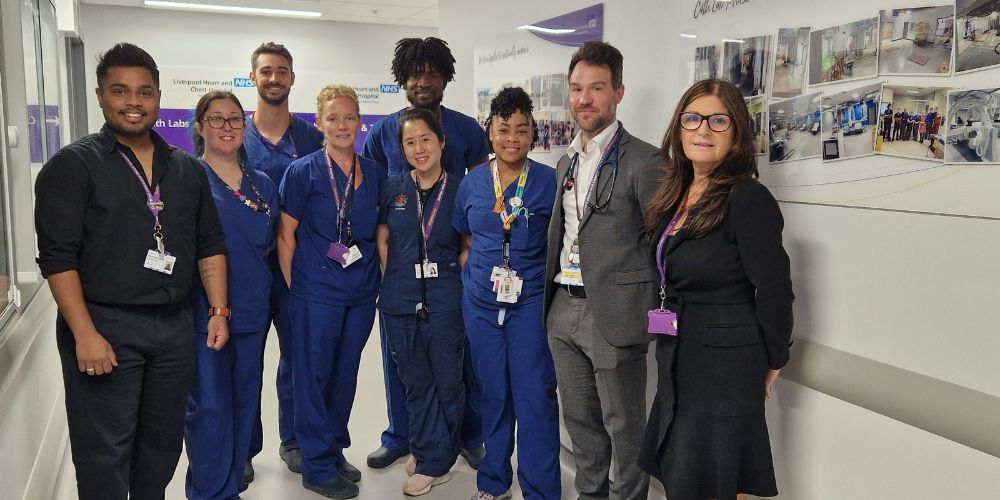Cath Lab redevelopment – one year on
 It’s been one year since the official opening of the six new state-of-the-art Cath Labs here at LHCH. The facility enables thousands of cardiology and respiratory procedures to be carried out every year for the benefit of patients across Merseyside, Cheshire, North Wales, Isle of Man and beyond.
It’s been one year since the official opening of the six new state-of-the-art Cath Labs here at LHCH. The facility enables thousands of cardiology and respiratory procedures to be carried out every year for the benefit of patients across Merseyside, Cheshire, North Wales, Isle of Man and beyond.
Dr Nick Palmer, Consultant Cardiologist and Jeanette Broome, Cath Labs Directorate Manager were both instrumental in the delivery of the multi-year project. We caught up with them to see how things are progressing.
What difference has the new facilities made for staff?
A big ambition of the Cath Labs was to provide better digital education, share learning nationally and internationally, and to educate and develop our own teams. We now have built-in cameras within Cath Labs and have consequently been invited to host and take part in numerous educational events. We can stream live cases onsite to the education rooms and staff are able to watch and learn from these onsite. This is ideal as not all the team can attend conferences at the same time.
We’ve been able to grow our teams, have a strong leadership structure and have more opportunities for progression and development. There is now a dedicated area for staff to complete training or study.
Has one change stood out as making the biggest impact?
The improved flow, privacy and dignity of patients and families has been huge. For example, we now can accommodate families waiting for updates on their loved ones, who have been brought in for an emergency, and keep them informed. The whole patient and family experience along with safety standards is so much better.
There is also a dedicated bereavement suite for relatives to visit their loved ones, say their goodbyes in private for as long as they wish to.
Have you been able to increase the number of patients treated?
One of the key drivers of re-developing the labs was to increase capacity. We have a very busy emergency heart attack service and sometimes find it difficult to cope with urgent transfers.
We are better equipped to manage the flow of patients and segregate emergency and elective patients. We have a fully staffed recovery unit, so our patients are always well looked after. For example, we recently received twelve emergencies in one day and were able to continue all planned procedures too.
In the last year, we have been able to accommodate more Transcatheter Aortic Valve Implantation (TAVI) cases. This is a minimally invasive procedure that replaces a faulty aortic valve. There is a dedicated team, and the new facility ensures the right equipment is available in the right place at the right time. The cooperation, flexibility and work of the team and the use of a coordinator to schedule can maximise the capacity.
The demand for structural interventional cardiology, which uses minimally invasive procedures to treat heart disease, is increasing and we needed to future proof for this and to meet demand for the future.
We have just recently completed the refurbishment of our seventh new Cath Lab, once this is fully staffed, we will be able to treat even more patients.
Any plans for future improvements?
The Respiratory Physicians and Scope room are looking to introduce electromagnetic bronchoscopy. This is a brand-new minimally invasive service for lung biopsy and aims to identify little masses in the lungs avoiding open biopsies.
We will be further developing percutaneous intervention for mitral valve replacement/ repair or tricuspid valve repair. These structural interventions are for people who are not generally well enough for an operation and previously would have been treated with medication. These new procedures give us opportunity to repair their valves in a safer, minimally invasive way, very effectively.
We have plans to provide more complex treatments as we have a dedicated team to support. An example of this is Complex Angioplasty which is a minimally invasive procedure that treats coronary artery disease. Some patients, due to other health conditions, are not suitable for a heart bypass operation and so we can support with medical procedures such as this. Similarly, a Complex Percutaneous Coronary Intervention (PCI) which involves Chronic Total Occlusion (CTO) which is an artery that has been blocked for a long time.
We currently have six Cath Labs open and operational. Cath Lab seven is now open and there are plans in place for this to be fully staffed and operational by April.
There are always advances in technology e.g. different methods of imaging patients. We will take new advances on gradually when we are up and running fully with seven labs.
%20(3).jpg)
Pictured left - Professor Stables, Consultant Cardiologist and Dr Raphael Perry, former Medical Director at the official opening and pictured right Dr Nick Palmer, Consultant Cardiologist.